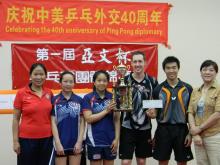Within the next few years, I plan to open a professional table tennis training center here in Akron, Ohio. As I look into the possibility of hiring some elite coaches, I have written out some criteria. Today, I want to share my thoughts with you as to what I feel would make an excellent coach.
He must first know the info. He must know table tennis at an elite level.
He must be able to explain the info. Many top players understand how to play really well, but they must be able to explain it clearly to an 800-rated player, a 2000-rated player, a 2600-rated player, etc… It doesn’t benefit the student to have an awesome coach that can’t properly teach the information.
He must teach level-appropriate and style appropriate material. I know of one coach who is trying to teach off-the-bounce counterlooping to some 1500-rated long pips blockers! This isn’t appropriate for their style or level. The best coach knows what to teach and when to teach it. The coach might have lots of information to say, but the student might not be ready to absorb everything during the first lesson or even the first year of lessons!
He must be willing to change/improve his skills. Table tennis is constantly changing, and it is vitally important that the coach be willing to improve his coaching techniques and make changes. I have personally had to change my coaching style in table tennis during the last several years. Some of my ideas where outdated. I am very thankful to Carl Hardin, Massimo Costantini, Joji Yamazaki, Sameh Awadallah, Zhou Xin, Marles Martins, Yahao Zhang, Cheng Li, and Wang Zhen for the help they have given me in guiding me in the right way to play and coach.
He must be able to teach different personalities. Some players need to be pressured, some players need to be complimented, some players need to be criticized, some players need to be challenged – the coach must understand how to deal with each student in a unique way.
He must be able to teach private lessons, group lessons, and at tournaments. Coaching in private lessons involves being able to personalize the hour for that particular student and weekly discussing goals, training schedule, and strategies with that one student. Training in group lessons involves being able to quickly assess a student and give brief appropriate comments in less than 2-3 minutes. Coaching at tournaments is the most challenging and involves knowing the students’ strengths, weaknesses, tendencies, capabilities, and personality.
As I think and pray about which coaches to hire, I’ll probably come up with dozens of other criteria. As I critically assess other coaches, I hope to be able to better my own skills, make changes where necessary, and become the best coach that I can possibly be.
The Best Coach

Read About My Criteria For Selecting an Assistant Coach
Category:



